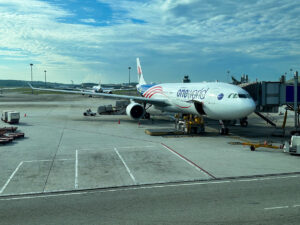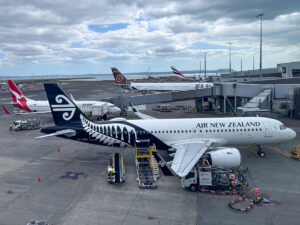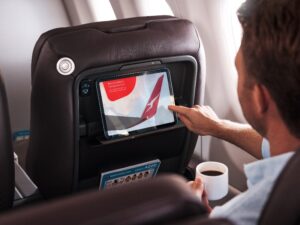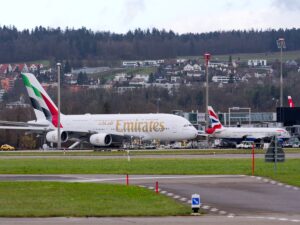
Meanwhile, airlines and travel companies are pulling out all the stops to entice people to keep travelling. Many airlines and hotel chains have introduced generous new travel waivers and some are also making it easier for members to earn or renew status this year.
We recognise that the situation is constantly changing, and there is a lot of “noise” out there. So, we’ve put together a summary of the latest coronavirus travel updates from the past few days that are relevant to Australian frequent flyers. Please note that this information could change at any time.
This article is specifically looking at the implications of COVID-19 in terms of travel and loyalty programs. For the latest health advice, we recommend checking Australian government updates and the latest World Health Organization advice.
This article was last updated at 6am (AEDT) on 13 March 2020.
Latest Smartraveller advice
A good place to get travel advice updates from the Australian government is the Smartraveller website.
Here is an excerpt of the latest Smartraveller advice as of 12 March 2020:
Be prepared for delays and disruption. Take into account what this might mean for your health, and your family, work or study responsibilities.
When you’re travelling, you’re also likely to come into contact with more people than usual, which could increase the risk you’ll come into contact with the virus. Consider carefully your need to travel if you have underlying health conditions that may put you at greater risk. If in doubt, consult your doctor.
It’s important you understand the risks you’re taking and that efforts to control the spread of COVID-19 may cause further travel disruptions. On this basis, the Australian Government has asked public servants to minimise official overseas travel at this time, and to instead use video-conferencing and other communication technologies as much as possible.
Particularly if you’re elderly or have an underlying health condition, you should carefully consider your travel plans and consult your doctor before travelling.
Airlines waiving change fees
Most major international airlines have now introduced change fee waivers, giving travellers the opportunity to change or re-book their travel with a new destination or travel dates. However, some airlines have more generous policies than others.
The Qantas and Jetstar change fee waiver policy is particularly uncompetitive. You’ll only be allowed one free flight change if you book an international flight between 10-31 March 2020 for travel until 30 June 2020. Additionally, you can only change to a new flight prior to 30 June 2020. The situation may or may not have improved by June, so this is quite restrictive.
Virgin Australia is waiving change fees on all new and existing international bookings made until 31 March 2020, for travel until 30 June 2020. If you decide to change your flight, your new travel dates can be any time within 12 months of your original dates.
Australian government bans arrivals from Italy
On 11 March 2020, the Australian government expanded its immigration restrictions that already applied – and continue to apply – to foreign nationals that have been in or transited through mainland China, Iran or South Korea in the previous 14 days. The travel ban now also applies to travellers that have been to Italy in the previous fortnight. Australian citizens, permanent residents and their immediate family members are exempted, but must self-isolate for two weeks after returning to Australia.
Other countries introduce new travel bans
Many other travel restrictions have been imposed by other countries. You can see a list of government measures related to coronavirus on the IATA website.
Of particular note is a new ban on travellers from Europe entering the United States for 30 days. The travel ban does not apply to U.S. citizens and permanent residents, and only affects travellers that have been within the Schengen Area (which excludes the U.K.) in the past two weeks. This comes into affect for flights departing after 3.59am GMT on Saturday, 14 March 2020. You can discuss this issue on the Australian Frequent Flyer forum: USA restricts travel from Europe’s Schengen area
The Indian government is also closing the country’s borders, with some exceptions, effective from 12pm GMT on Friday, 13 March 2020.
Israel is requiring all travellers to self-quarantine after arriving in the country. Non-citizens are being refused entry unless they can prove they have a place to stay for their quarantine period.
Meanwhile, Kuwait International Airport is closing indefinitely from 13 March 2020, as the Kuwaiti government attempts to stop the spread of the virus in Kuwait.
Venezuela is also suspending flights from Europe for a month.
Please note that this is not an exhaustive list and things are constantly changing.
More airline status extensions
Qatar Airways is offering Privilege Club members that are affected by COVID-19 travel restrictions a status extension of up to six-months. This applies to current Privilege Club elite members whose status is due to expire by 31 January 2020. Eligible members must log into the Qatar Airways website to claim their offer by 24 March 2020.
Meanwhile, Emirates is awarding 20% bonus tier miles for trips taken until 30 June 2020, and Skywards Silver, Gold and Platinum members can retain their status this year with only 80% of the usual tier miles required.
IHG Rewards Club, a hotel loyalty program, has just announced that it is reducing its 2020 status re-qualification targets by 25%.
Airlines slash capacity, ground aircraft
Many airlines have cancelled significant amounts of flights due to the current weak demand and travel restrictions. Qantas is reducing international flights on many routes until mid-September 2019, including temporarily axing Singapore-London service.
Meanwhile, Lufthansa has grounded its entire A380 fleet and cancelled many flights over the coming months. Korean Air and El Al are among a growing list of airlines to have taken similarly drastic measures.
Some countries are now in lockdown
Italy has already been on lockdown, with schools, universities and many businesses closed, since the start of this week. Some other European countries – Ireland and Denmark – are also now taking similar measures. Slovakia too is now closing its airports and placing the country in lockdown.
UK travel insurance company stops selling new policies
A UK insurer, LV=, has decided to suspend issuing new travel insurance policies. Existing policies are unaffected, but it shows the precarious situation that many travel insurance providers are currently in.
Keep in mind that most new travel insurance policies do not cover coronavirus as it is a known event.
Smartraveller advises to avoid cruises
The Australian government is recommending that all travellers – especially those with underlying health conditions – reconsider taking a cruise at this time. The Smartraveller website says:
The cruise industry has put strong measures in place for the health and safety of passengers. All passengers and crew are screened before they board. Cruise lines will deny boarding to anyone who has visited or transited the most affected countries (China, including Hong Kong and Macau, Iran, South Korea and the most affected municipalities in Italy) in the 14 days before embarkation. Some itineraries have changed. Expect more, and check with your cruise operator.
Australians, particularly those with underlying health concerns should reconsider taking an overseas cruise at this time due to COVID-19. If in doubt, consult a medical professional before travelling.
There have been instances of cruise ships being put into quarantine, countries preventing disembarkation of ships or denying entry to ports. The itineraries of a number of cruise ships have changed. Disruptions to cruise ship itineraries due to COVID-19 can have significant consequences for travellers. The situation is fluid and you can expect further disruptions.
Repatriation from cruise ships affected by COVID-19 should not be relied upon as an option.
Australian Frequent Flyer has set up a new forum for news & discussion about COVID-19: Coronavirus (COVID-19) News & Discussion















































































